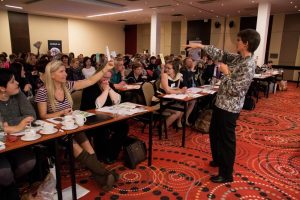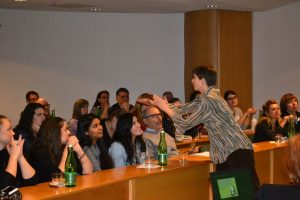
I often give workshops on various aspects of evidence-based teaching, and enjoy working with hosts to prepare a workshop tailored to the needs of those who’ll attend it. All of these workshops center around helping faculty to understand what we’ve learned from all the recent work on effective teaching practices in higher education, and especially, to put that understanding into practice. A good “starter workshop” is Evidence-Based Practices in Higher Education (this can also be specifically tailored to STEM or to medical education). If your faculty are already aware of the evidence but there are obstacles to implementation, another workshop may be more useful; specifically, one of the most common difficulties is that of “finding the class time” to implement effective practices when each of us has so much content to “get through.” The workshop The Content Monster: How Less Talking Can Mean More Learning addresses this concern with specific strategies and examples as well as evidence, introducing the general model for what is sometimes called a “flipped classroom.”
Often, many faculty are convinced that teaching practices must change, but aren’t sure how to plan their course if they’ll be doing something other than traditional teaching. The practical workshop on How to Design an Outcomes-Based Course helps faculty think clearly through the process of starting with their learning goals, identifying which ones need to be addressed using precious in-class time and how to think about doing so, and how to make sure students learn the other goals, as well. Finally, the last major concern that must be addressed is the behavior of students: our practices will only be effective if not just we, but students, also change. Using insights from the cognitive sciences as well as the teaching literature, the workshop on Motivating Students addresses this concern.
In addition, am a certified trainer/consultant in a teaching strategy called Team-Based Learning (TBL),which is a type of flipped-classroom strategy (though popular long before the term “flipped classroom” was invented!) in which students prepare with basic content knowledge outside of class, and then after assuring that they are truly prepared, they work though increasingly complex application problems, in permanent teams, during class time. I am happy to provide information and advice on TBL, or anything from a one-hour faculty development workshop to a full day event in which faculty receive an introduction to all the major aspects of TBL, along with lots of opportunities to consider and develop how they might apply the strategy to one or more of their own courses.
There is a substantial and growing literature supporting the use of pedagogies that include or support metacognition and reflection, and a popular workshop I give (reviewed here) presents the evidence base for these pedagogies as well as giving several specific examples of such practices that faculty can put into use right away in their classrooms.
Within STEM teaching specifically, one of the weakest areas of most of our courses is the quality of the exams. Although this is a large topic, an introductory workshop on How To Write a Good Exam can help bring some clarity to the process of exam writing.
Finally, as part of our work designing modules to integrate quantitative thinking into introductory biology, my colleagues on this project and I each are available to provide one-hour workshops on the use of our modules, or longer workshops on designing your own modules.
